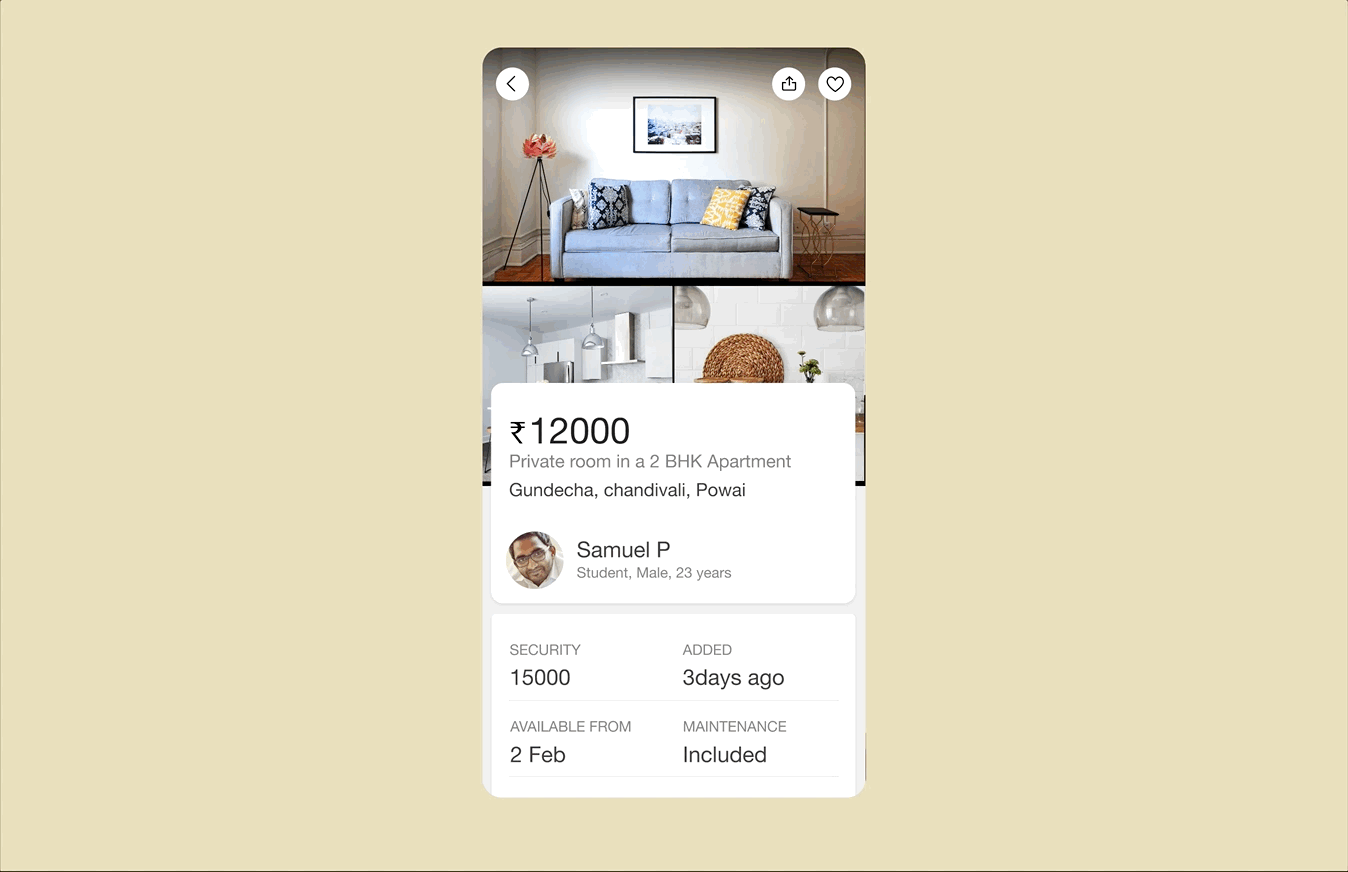Designing India’s First Shared Housing Experience for Young Renters

Housing.com is a real estate platform where people can find houses for rent or purchase.
By the beginning of 2015 Housing.com became the go to place to search for flats online amongst the younger generation in India. However, the company failed to serve those users who were looking for low rental apartments or a room to share. We decided to explore this target group and solve their issue.
With this project I got the chance to design the experience for one of India's fastest growing startups providing the first platform that solved the issue of finding shared flats in the country.
The Challenge
Capture the traction on the platform
Our goal for the project was to understand the users who were looking for low rental flats or shared flats and fulfil their house finding needs. Since the platform offered less houses in the budget of this target group, we were only left with the option to focus on designing the experience of finding shared flats.
Our high level goals:
1. Create a platform for finding affordable shared spaces to rent.
2. Create a platform for subletters to upload their shared spaces.
3. Create a platform for collaboration and engagement.
My Role
I conceptualized and designed both, the 'discovering' and 'posting a flat' experience on the mobile application. In addition, I carried out the research in collaboration with a prototyper and two product managers.
Getting started
Users are more specific about their needs than we thought
Once we roughly shaped the direction, we spoke to 21 users from our target group and quickly learned that the current product was not serving their needs at all.
Top findings from the user research
1. Users are very particular with price and cleanliness.
2. Users are quite particular about food habits and lifestyle of the people they live with.
3. There is no gender flexibility. Females do not want to share the flat with males and house owners do not accept the concept of mixed gender flats in India.
4. Users are tired of visiting houses and not finding the one they like.
5. Users are more comfortable living with people who have similar jobs.
6. Location plays a major role in choosing a house.
Abstracting the research insights
To move away rom existing biases, I converted all the research insights into keywords which everyone can understand and align with.

Reframing the problem
Finding the right shared flat is equal to finding the right flatmate
The research showed that finding a shared flat is not just about finding a room in a flat. It has a lot more to do with the person whom the flat seeker is going to share the place with. This insight provided us a different perspective at the problem than the one we initially started with. Eventually, we reframed the problem statement.
How can we help the users find the ideal flat including
the right flatmate?
High level flow chart
The flow mainly focuses on finding flatmates through flats or finding other seekers looking for flats. The idea is to connect people with similar interests and create a platform for them to discuss.
.jpg)

On the first screen the user gets to choose the gender to search or upload a flat to find a flatmate.

A list of available houses in the locality is displayed
and the user can edit the location or filter by choice.

The user has a pool of filters to refine the search and find the preferred type of house.

The gallery view helps the users to quickly navigate to the rooms they are interested in.

The flat detail page is emphasising on photographs and the user can choose to swipe up for more details.

Users can access the profile of the person who uploaded the flat and initiate a chat.

Flat seeker and flat provider can communicate on a chat platform and get to know each other.
Helping users to find the right flatmates
We were designing for both, flat seekers as well as flat subletters. We spoke to four people who wanted to rent the extra space available in their flat and their wishes concerning potential flatmates was quite similar to those of the flat seekers. However, the design challenges were a slightly different when it came to the scenario of uploading the flat post.
Back in 2015, it was common to post flats on Facebook, as it was then the only platform available to attract flat seekers. Although, it was a time taking process to join a local community group on Facebook and upload only after getting the permission. After posting the flat the users had to deal with many non potential leads, draining their energy quickly.
How to make the flat posting experience easy and design for providing more potential leads?
High level flow chart
.jpg)
Designs that helped the users upload their shared flat

When the user lands on the app, he/she gets the option to upload a shared flat.

A presentation of all the steps the user has to perform in order to complete posting the flat

A customised camera helps users to upload high quality photos.

The user can easily pick flat details from the suggestions.

Users can enter the rent they are expecting from each person.

Users can update the address just by marking it on the map.

Users can enter the personal details in order to get potential leads.

Users can choose preferences to avoid unwanted leads and save time.

Once the user has updated all the details, he/she can preview it and post the flat online.
Interactions loved by users.
The final prototypes were created by the visual design team. I made a concept video documentation to communicate my ideas to the visual design and engineering team.
Concept video of a uploader interaction behaviour.
Concept video of a listing to profile transition.
